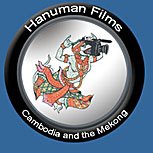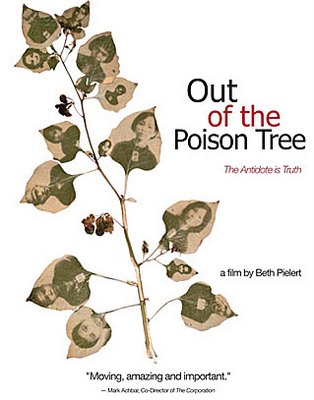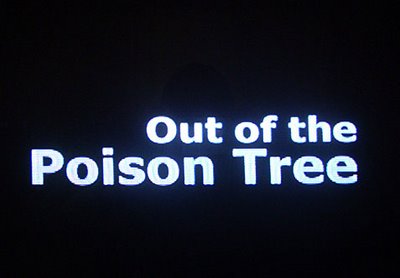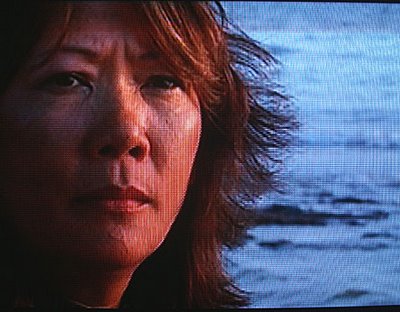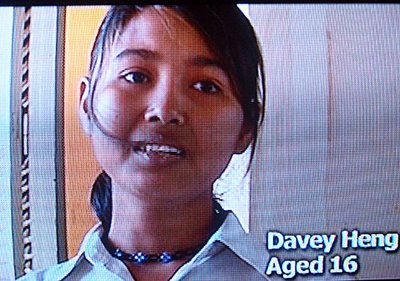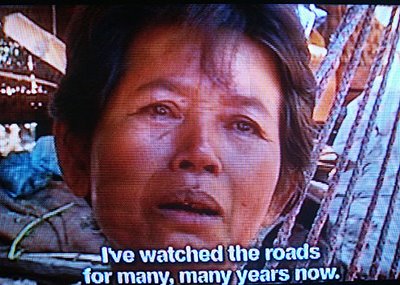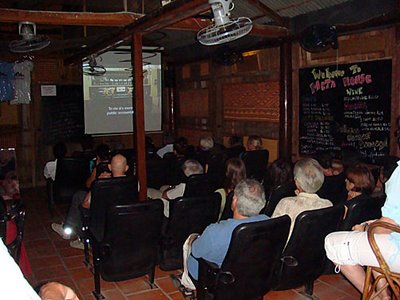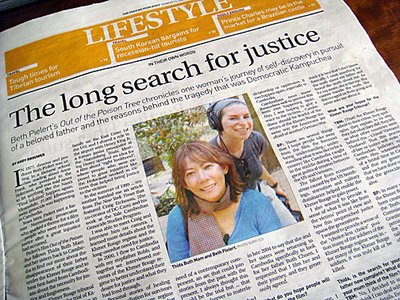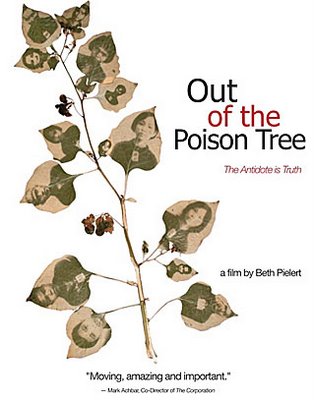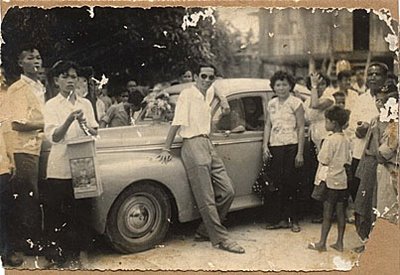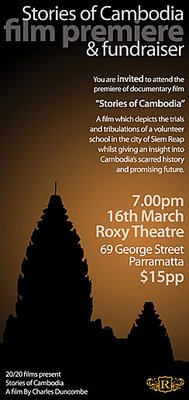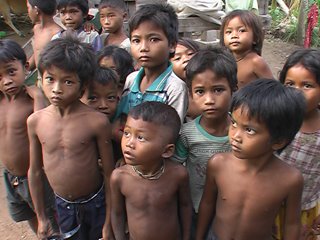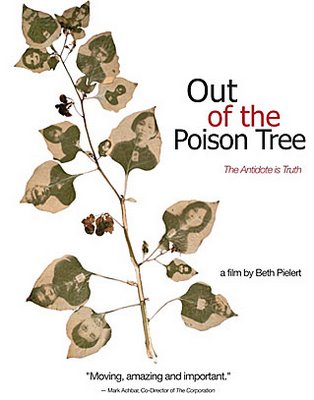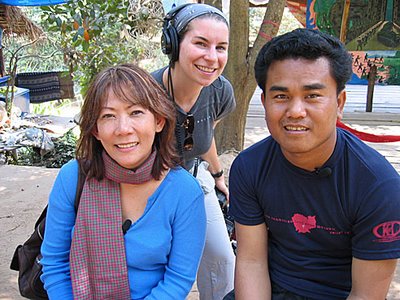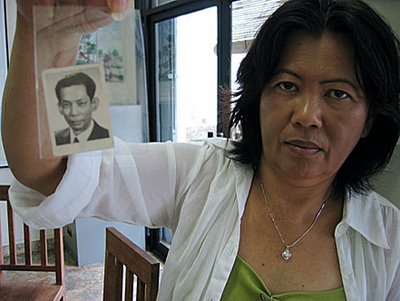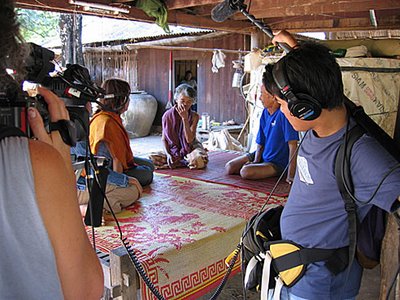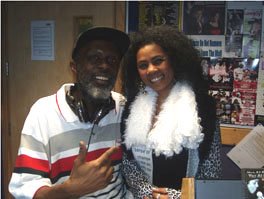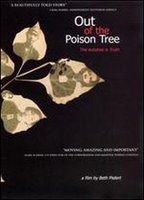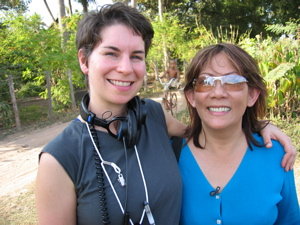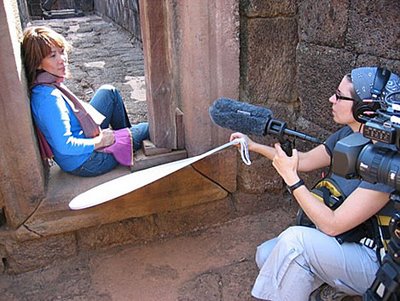 Thida (left) and Beth (right) filming Out of the Poison Tree at Angkor
Thida (left) and Beth (right) filming Out of the Poison Tree at Angkor
This coming Saturday (14th March), the first showing in Cambodia of the documentary film
Out of the Poison Tree, will take place at Meta House (next to Wat Botum) at 6.30pm. Filmmaker Beth Pielert's beautiful and moving film follows Thida Buth Mam and her two sisters back to Cambodia to find out more about the disappearance of their father and to hear first-hand from Cambodians about the necessity for justice, a trial and forgiveness. The most poignant plea for justice comes from a teenage schoolgirl, Davey Heng, standing amongst her classroom peers, in a flood of tears, but determined to state her point of view. As the Khmer Rouge Tribunal readies itself for the trial of Comrade Duch, this film is aptly timed for the voice it gives to ordinary Cambodians as well as well-known figures like Youk Chhang and Aki Ra. Archive footage and music from Long Beach artist praChly complete the picture. I urge you to come along to Meta House and watch this film. Below is a two-person interview with Beth and Thida to give you more details about the film and their personal views.
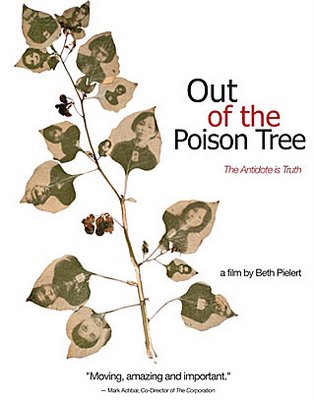 Q. Where did the idea for the film come from?
Q. Where did the idea for the film come from?A. [
Beth]
In 1998 when I finishing up my short film Kiss My Cleats, I was visiting family on the East Coast and I shared a ride to the airport with Henry King Jr., a former junior prosecutor at the Nuremberg Trials. Meeting Henry sparked an idea for a film about 'Right Livelihood' where people who were exposed to great injustices like the Holocaust worked in careers that helped bring justice to the victims. The summer of 1999, I was spending time with Henry and researching other potential subjects when my mother handed me an article from the New York Times that featured Craig Etcheson and his work at the Yale Cambodian Genocide Studies Program. As I was in Connecticut already, I was able to meet Craig and interview him on camera. In doing so, I learned more details about the Khmer Rouge regime and the long-overdue need for justice. By that time, Craig had already co-created The Documentation Center of Cambodia (DC-Cam) and encouraged me to get to Cambodia in person as the trial in his opinion was bound to happen soon (this was 1999). In 2000 I flew to Cambodia with my step-father Robb and together we spent 10-days exploring Phnom Penh and Siem Reap and interviewing survivors of the Khmer Rouge regime to better understand their desire for justice and what they had lived through. It was after we journeyed to Siem Reap and Robb discovered Aki Ra and the Landmine Museum that I became hooked on the story of healing and reconciliation for Cambodia. This was the year 2000 and personal stories of healing and reconciliation for survivors of the Khmer Rouge regime were not yet prevalent. I began production in earnest on Out of the Poison Tree in 2001.
Q. How did you and Thida meet? A. [Beth] I met Thida Buth Mam in 2002 through Maureen Phalon who knew Anne Weills, co-creator of CORKR. By 2002 I had already shot interviews with the Director of DC-Cam, Youk Chhang and Aki Ra, in addition to a former Khmer Rouge soldier and loads of smaller interviews all of which made up the framework for the film. But, I was in need of a contemporary component, an arc that could join stories from the past with the present. I always thought this would be the Trial but, unfortunately for the people of Cambodia and the film, that was taking forever to materialize. Anne suggested I meet with Thida, who had lived through the regime and who could potentially serve as a consultant. Thida and her incredible family were so generous with their time and stories that Thida went from consultant, to translator to Associate Producer of the film. When Thida phoned one day in late 2004 to say that she and her sisters were returning to Cambodia specifically to look for her father Buth Choen, I requested that I film her and their journey and they generously agreed.
Q. When did filming take place in Cambodia? How long did the process take from start to finish?
A [Beth] There were 3 trips to Cambodia: the first was a research, pre-production trip in 2000, the second was the first production trip in 2001, and the third and final production trip took place in 2005 with Thida and her sisters. The film took seven years from concept to completion: 1999-2006.
Q. What do you hope people will take from the film?
A. [Thida] For me, I want to tell the Khmer Rouge genocide story. If we look into the reasons the Khmer Rouge had which led to the genocide, they were all reasonable, especially when a nation is under dictatorship or oppression, it can happen again, especially in Cambodia. The Cambodians must know themselves well to prevent this from ever happening again. Also, I was hoping to give voice to the victims of Cambodia. I hope I represent them well. Cambodians should be fearful of the return of the Khmer Rouge the same way the Americans are afraid of another Vietnam War.
A. [Beth] There are several things that I hope people take away from Out of the Poison Tree, the foremost being - understanding. Understanding what it was like to be a country like Cambodia caught in the middle during a time of great political tension between the US and Vietnam. The fallout from economic stress caused by the US bombings, starvation and military dominance helped enable the Khmer Rouge to come to power. I also wanted to provide a sense for what it was like from the victim's point-of-view and how this unquenched justice spans the generations as you see with Heng Davey, the young school girl. I wanted to provide a sense for the 'choiceless choice' position many of the soldiers of the Khmer Rouge Regime were in - for many of the Khmer Rouge soldiers it was truly kill or be killed. Finally, I wanted to capture some of incredible beauty that is uniquely Cambodian both in landscape and in the Khmer people. My one regret is that I didn't adequately capture the humor of Thida and her sisters, a humor and lack of bitterness that truly amazes me to this day.
Q. Thida, is the search for your father now complete? What did your Mum think of the film?
A [Thida] No, I decided to stop. I don't think I can deal with finding out more details. Every time we find out a small fact around my father's fate, I went crazy in my head and heart. I think it is best that I don't know. I have many years more to live and I don't want to live with that horrifying story of my father. Basically, I went searching the truth about my father and found the truth about me, I cannot handle the truth. As for my mum, she is like me, she cannot handle the truth. She discouraged us from going and never asks me about it. When I bring it up, she starts crying, so I stop bringing it up.
Q. What are your hopes for the Khmer Rouge Tribunal?
A. [Thida] Many things, here is my short list:
1. They (all of the Khmer Rouge leaders) admit to their crime.
2. They apologize.
3. They explain to us why they did what they did.
4. They tell us who else was behind this. China? Vietnam? Thailand?
5. That this practice of law or justice, will make the Cambodian judiciary system better.
6. Acknowledgment of a brutal time in Cambodia where history will be well written and that my generation feel that we have done our best.
7. The Genocide story will stay alive.
A. [Beth] In many ways I wish that the Khmer Rouge Tribunal had been created in the image of the Truth and Reconciliation Commission out of South Africa. I think that granting amnesty to the perpetrators may have expedited the Trial and yielded more details about the 'how and whys' of the Khmer Rouge which would help create an accurate account for the history books, help the world understand how this could happen so as to prevent future Khmer Rouge and most important enable Khmer Rouge leaders to say to the Khmer people: 'I did this, this is why, I know it was wrong and I'm sorry'. That said, I know Duch just said he was sorry which is huge. Admission and remorse - finally! I also echo Thida's wishes and my hope is that there are clear consequences, however late they may be, for the egregious acts that were committed during the Khmer Rouge and that they are enforced and examples are set for a better government in Srok Khmer.
Q. Finally, Thida will you return to live in Cambodia?
A [Thida] I have bought some land where I plan to build a home when I can afford it. I hope, in my retirement, to live in Cambodia most of the time. I hope I can contribute back to my homeland.
Note: If you wish to purchase the dvd, visit Beth Pielert's
GoodFilmWorks website.
Labels: Beth Pielert, Khmer Rouge, Out of the Poison Tree, Thida Buth Mam
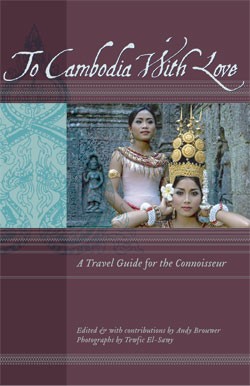 For those interested, here's the draft cover of the guidebook I'm editing, called To Cambodia With Love - A Travel Guide for the Connoisseur, to be published by ThingsAsian Press. Look out for an early 2010 publication date.
For those interested, here's the draft cover of the guidebook I'm editing, called To Cambodia With Love - A Travel Guide for the Connoisseur, to be published by ThingsAsian Press. Look out for an early 2010 publication date.